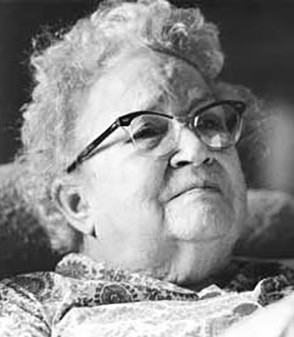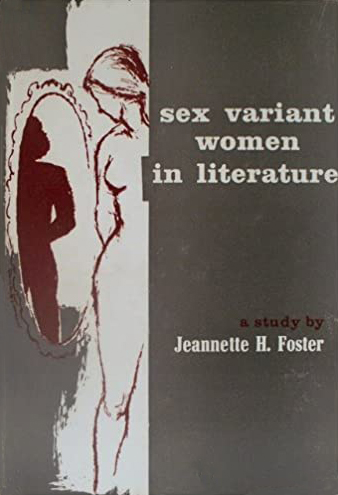Jeannette Howard Foster
November 3, 1895–July 26, 1981
Inducted in 2019
Non Fiction
Sex Variant Women in Literature (1957)
Multiple short works, including:
“White Night,” poem (1914)
“Lucky Star,” story in Harpers Magazine (1927)
November 3, 1895–July 26, 1981
Inducted in 2019
Non Fiction
Sex Variant Women in Literature (1957)
Multiple short works, including:
“White Night,” poem (1914)
“Lucky Star,” story in Harpers Magazine (1927)

I knew damn well I didn’t want to major in Latin!
Born in Oak Park, Illinois, in 1895, Jeannette Howard Foster is best known as the author of Sex Variant Women in Literature (1957), a germinal study that earned her recognition as a foremother of lesbian history and literature. The daughter of Winslow Howard and Mabel (Burr) Foster, she excelled in her studies at the Parker Practice School and graduated from Calumet High School in 1912. Entering the University of Chicago the following autumn, she studied chemistry and physics, but preferred writing poetry. She wrote her earliest surviving poem, “White Night” (1914), while watching a woman from the window of her Beecher Hall dormitory at the University of Chicago.
In 1915, Foster…
read moreI knew damn well I didn’t want to major in Latin!
Born in Oak Park, Illinois, in 1895, Jeannette Howard Foster is best known as the author of Sex Variant Women in Literature (1957), a germinal study that earned her recognition as a foremother of lesbian history and literature. The daughter of Winslow Howard and Mabel (Burr) Foster, she excelled in her studies at the Parker Practice School and graduated from Calumet High School in 1912. Entering the University of Chicago the following autumn, she studied chemistry and physics, but preferred writing poetry. She wrote her earliest surviving poem, “White Night” (1914), while watching a woman from the window of her Beecher Hall dormitory at the University of Chicago.
In 1915, Foster transferred to Rockford College, where she majored in English and American literature and published her first short stories in a school magazine. Following graduation in 1918, she taught high school science in Kentucky and Wisconsin, before returning to the University of Chicago to earn an M.A. in English, completed in 1922.
During the next decade, as she taught English at women’s colleges in Minnesota, Georgia, and Virginia, Foster wrote numerous poems and pieces of short fiction. Her story, “Lucky Star,” appeared in Harpers Magazine in 1927, but there was no market for her lesbian poetry.
Restless, Foster decided to change careers. After earning a Bachelor of Library Science degree from Emory University in 1932, she found her way back to the University of Chicago, where in 1936 she became one of the first women to earn a doctorate from the Graduate Library School. While a student at the University of Chicago, Foster searched its library collections for books containing references to the existence of lesbians, bisexuals, and cross dressers, taking detailed notes on each title. She continued working on this project after moving to Philadelphia to become a professor at the Drexel Institute of Technology’s Library School in 1937. In her free time, she visited countless East Coast libraries in search of lesbian literature. Her original intent was to include only works that she had seen firsthand, a goal made difficult by cataloging obscurities, inaccessible or lost material, and closed collections. In her spare time she continued writing poetry and short fiction, but filed it away due to lack of publication outlets.
In 1941, after reading about the pioneering sex research of Indiana University professor Dr. Alfred Kinsey, Foster volunteered to sit for an interview, and subsequently assisted him in identifying additional interviewees. Impressed by her extensive knowledge and scholarly credentials, Kinsey invited her to join his staff shortly after he incorporated the Institute for Sex Research in 1948. During her four years as Kinsey’s librarian, Foster organized materials he had collected from all over the world, and at the same time continued her search for titles to add to her study of lesbian literature. While at the Institute, Foster also grew close to another employee, Hazel Toliver, who became her life partner. Concerned that Kinsey might appropriate her research or suppress it, Foster and Toliver accepted positions at the University of Kansas City and moved to Missouri in 1952.
Foster had hoped to interest a university press or reputable publisher in her study of approximately 2600 years of literary images of female sex variants—women today called lesbian, bisexual, or transsexual—but in an era infused with McCarthyism, publishers regarded her subject matter as subversive. Turning to a subsidy press, she spent nearly $4,500 of her retirement savings to have the book printed, and she made the bold decision to publish it under her own name. Unfortunately, her delight upon holding the first copy of Sex Variant Women in Literature in her hands in February, 1957, soon turned to bitter disappointment because it failed to generate the reviews.
Unknown to Foster until later that year, the publication of her book coincided with the emergence of The Ladder, the first nationally distributed monthly lesbian magazine. In addition to alerting other gays and lesbians to her book, The Ladder became an outlet for the short stories and novella she had written in the 1930s. She published her creative work under pseudonyms (many of them derived from family names), but also wrote numerous reviews and letters to the editor under her own name.
As the gay liberation movement emerged and called for social change in the 1960s, Foster gained long overdue recognition for her pioneering work to establish a canon of lesbian literature. Organizers of the first Lesbian Writers Conference, held in Chicago in September 1974, dedicated the conference to her. That same year, The American Library Association Task Force on Gay Liberation gave Sex Variant Women in Literature its third Gay Book Award. This recognition of the long out-of-print work led to its reissuance by Diana Press (1976) and to the publication of Two Women: The Poetry of Jeannette Foster and Valerie Taylor (Womanpress, 1976). Her translation of Renée Vivien’s A Woman Appeared to Me became one of the first books published by the newly established Naiad Press, enabling her work to reach thousands of lesbian readers worldwide.
Like Dr. Kinsey’s pioneering studies, Jeannette Howard Foster’s Sex Variant Women in Literature shattered myths and misunderstandings and touched the lives of countless lesbians and gays coming of age in the 1950s and beyond. As growing numbers of people visited libraries in search of gay books, they often turned to Sex Variant Women in Literature as a guide. Foster’s literary and intellectual heirs include the distinguished historian Lillian Faderman, who in 1962 discovered Foster’s book on the shelves of UCLA’s English Reading Room. The book had a profound impact on her life, inspiring her to write Surpassing the Love of Men (1981). In Chicago, Joseph Gregg credited his literary activism to Foster’s book, which became an important tool when building the Gerber/Hart Library collection. These, and many similar examples, illustrate the far-reaching impact of Foster and her work.
—Joanne E. Passet

Chicago Literary Hall of Fame
Email: Don Evans
4043 N. Ravenswood Ave., #222
Chicago, IL 60613
773.414.2603